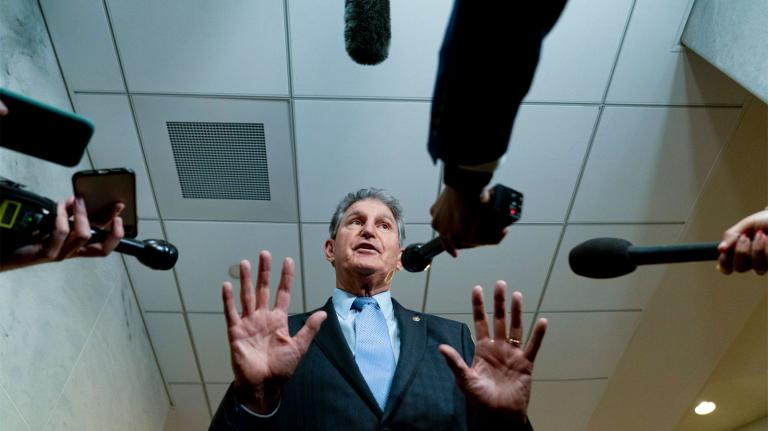Just a couple of weeks ago, it seemed like the United States — the biggest carbon polluter in history — was going to show up to the COP26 climate summit next month without a serious climate plan in hand.
A conservative member of the Democratic party with deep ties to the coal industry, Senator Joe Manchin of West Virginia, had succeeded in stripping President Joe Biden’s first-term agenda of its central climate component — a $150 billion system of incentives and penalties that would eliminate most of the emissions from the U.S.’ power sector. The White House was scrambling to come up with an alternative plan that would garner support from the disparate factions of the Democratic party, reduce emissions at the scale recommended by the Paris Agreement, and fit the strict rules that govern the U.S.’s Senate budget reconciliation process, which allows Democrats to bypass Republican opposition if they vote in absolute lockstep and sculpt their priorities into legislation that pertains to taxes, spending, and the debt limit.
On Thursday, the White House announced that a framework for such a plan had been reached. “When enacted, this framework will set the United States on course to meet its climate goals,” the White House said in a fact sheet unveiling the framework, which also includes the broad strokes of the legislation’s provisions on child care, home health care, affordable housing, and more. In all, the plan will cost $1.85 trillion, less than the $3.5 trillion Biden initially wanted but more than the $1.5 trillion Manchin said was his limit.
Biden hopes that the announcement will spur House Democrats to pass the first part of his agenda, a bipartisan infrastructure bill that contains a smattering of climate provisions and that has already passed the Senate. Finalized infrastructure legislation, along with the reconciliation framework, would give Biden something, at least, to point to as an accomplishment at COP26.
The long-awaited framework is light on details. Democrats still haven’t written legislation to flesh out the general provisions in the White House’s fact sheet. But the fact sheet says that the final reconciliation bill will include $555 billion to fight climate change — the “largest effort to combat climate change in American history,” the White House said. Here’s what it includes:
- $320 billion in tax credits for clean energy, energy transmission and storage, electric vehicles, and clean energy manufacturing.
- $110 billion in investments and incentives for new technologies (think: advanced energy storage) and domestic supply chains for these technologies. A portion of this funding will also go toward making existing industries like steel, cement, and aluminum greener.
- $105 billion in “resilience investments” — that’s money to address the effects of extreme weather like wildfires and hurricanes. Some of this money will also go toward creating a Civilian Climate Corps modeled after Franklin Delano Roosevelt’s Civilian Conservation Corps.
- $20 billion that the federal government will spend directly buying next-generation green technologies like small-scale nuclear reactors and clean construction materials.
- The bill will also create a Clean Energy and Sustainability Accelerator that will fund clean infrastructure and energy projects across the country with the aim of delivering 40 percent of the benefits of these projects to disadvantaged communities — communities of color, low-income communities, and communities that have suffered due to their proximity to fossil fuel infrastructure.
That’s most of what we know will be in the bill so far. It’s a far cry from Biden’s initial vision — a modified clean electricity standard that would have eliminated emissions from the power sector by 2035 in the service of his greater vision of putting America on a path to net-zero emissions by 2050. It also lacks a fee on emissions of methane from the oil and gas sector, a provision that Manchin reportedly nixed during negotiations. Energy wonks are still puzzling out whether the tax incentives in the budget reconciliation bill and the green funding in the infrastructure plan combined will reduce emissions at the scale that the Paris Agreement demands.
And it’s worth noting that, while the climate portion of this bill looks different from what Biden initially envisioned, it’s the only portion of the budget reconciliation package that emerged from negotiations with more or less all of its funding intact. Other programs weren’t so lucky. The bill no longer includes half a trillion dollars for a federal paid family and medical leave benefit. It was going to include an expansion to Medicare to cover vision, dental, and hearing. Only hearing made it through. And the plan, which was going to be funded by a tax on the wealth of billionaires, is now a surtax on multimillionaires that will affect their income but not their wealth.
Biden seemed confident that his party would be able to unite behind the framework as he headed to Congress to meet with lawmakers on Thursday morning. “It’s a good day,” Biden said as he arrived. “Everyone’s on board.” But it’s not clear that’s true. Manchin and Senator Kyrsten Sinema of Arizona, another conservative Democrat, have not yet actually committed to voting for the reconciliation bill as it stands. And progressives in the House, who have long insisted on passing the infrastructure and reconciliation bills in tandem, are loath to vote on infrastructure by itself. House Speaker Nancy Pelosi called for a vote on the infrastructure bill as soon as the White House announced it had a framework for its budget bill.
At a meeting with House lawmakers this morning, Biden asked for help passing his legislative agenda. “I need your votes,” he said, as some lawmakers started chanting, “Vote, vote, vote.”




